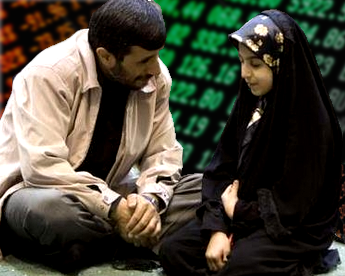 by MD in Toronto
by MD in TorontoCrescent Magazine
February 4th, 2010
If implemented as planned, Ahmadinejad’s economic reforms will demonstrate that without the social justice aspect, any claim to economic growth is empty rhetoric.
Right after taking office in 2005, the Fundamentalist President headed to Iran's poorest provinces, neglected by a decade of reformist-conservative mafias which did not go further in the economic arena than filling own and relatives' pockets with the wealth of the nation. In the humblest Khorasan, Ahmadinejad challenged these corruption networks: "If God wills, we will break the resistance to Justice, and raise its flag in all corners of this Islamic land". He seemed to know what was coming, as the mafias' attempt to impede this trend has today even led them to serve colored coup attempts planned and financed from abroad. In spite of this, the struggle to free Iran from such snobbish gangs is yet to be put off.
President Mahmoud Ahmadinejad of Iran has developed an iconic image worldwide for resisting Western political hegemony, but he might also become an economic role model for developing countries. Since his election as President of Iran in 2005 and re-election in 2009, one of Ahmedinejad's main domestic battles has been reform of the economic subsidy system in Iran. Currently Iran has one of the highest subsidized economies in the world.
Tehran subsidizes the price of fuel, bread and many other items for its entire population which leads to inefficient utilization of resources. Finally, after years of debate and amendments, Ahmadinejad’s subsidy reform bill received parliamentary approval last month (January 5, 2010).
Not surprisingly, western economists and media pundits immediately denounced Ahmadinejad’s economic subsidy reform bill as “absurd” and “devastating” to Iran's economy. However, as the bill was finalized, even international economic experts were forced to admit that it carries vast benefits to the Iranian economy.
The global subsidy initiative program of the International Institute for Sustainable Development (IISD) states that “under the proposed targeted cash-transfer system, people will receive payments based on their income, giving low-income families greater purchasing power…
Compared with price subsidies, targeted cash transfers have numerous advantages. Because people can choose how to spend their money, it leads to a more efficient allocation of resources. At the same time, the demand for fossil fuels can be expected to decline, in response to higher prices. Bringing domestic prices into line with world prices would also eliminate the current incentive to smuggle petroleum products out of Iran to neighboring countries. The extra revenue freed up by the subsidy reforms will provide the government with more funds for investment in infrastructure, and the higher fuel prices will spur producers to make their production processes more energy-efficient. As it is, Iran does not have enough refinery capacity to satisfy its domestic demand [investments for giving Iran refining self-sufficiency for 2012 were implemented last year] - so the fastest way to become resilient against possible trade sanctions affecting petroleum products is to reduce demand itself.
Under the old system in Iran, 70 percent of subsidies went to the country's richest 30 percent. The new bill also acts as a strong social justice instrument because it promotes wealth distribution based on income.
The West sees nothing right with Iran, so demonizing its new economic reform bill is not surprising as it undermines the fundamentals of the classical capitalist system which the West tries to impose on the rest of the world. Survival of the fittest or, as it is termed in current economic jargon “market competition”, sees no place for the concept of wealth distribution based on the needs of the poor.
The world has already witnessed how greedy Wall Street billionaires, responsible for America's economic meltdown, were bailed out but the average Joe was left out in the cold.
If implemented as planned, Ahmadinejad’s economic reforms will demonstrate that without the social justice aspect, any claim to economic growth is empty rhetoric.
خِرمن
兄
弟
Germán

















2 comments:
Watched on AlJazeera a month back, where 1 expert posed the possibility of a revolution due to the increased cost of EVERYTHING. Because if fuel prices go up, then everything from agri products to industrial products, which depend on fuel for production and/or transport, will increase. The anti-poor economic policy of the Shah was given as an example of the path Iran might take if reforms are implemented.
AlJazeera? You mean the same media outlet which claimed the Iranian government killed Neda and its own nuclear scientists, which labels the Iranian elections as "disputed" alongside our Western favorite propagandists, the same media claiming that AlQaeda is an "Islamist" group -whatever that nonsense means-, and that claims the problems of the Middle East have anything to do with religion,
"And do not pursue that of which you have no knowledge. Indeed, the (own) hearing, the (own) sight and the (own) heart - about all those one will be questioned." Quran 17:36
Post a Comment
Have your say ! (Criticism highly appreciated)